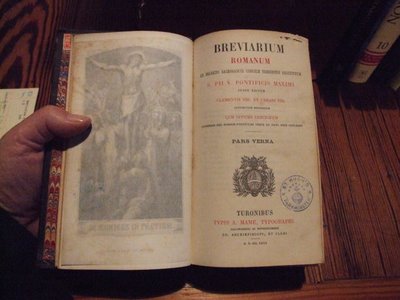Breviary - how long is long?
In addition to the offices sung in Choir and said privately, the Carthusians say the Little Office of the Blessed Virgin Mary either before or after each main office. There was a copy in my cell and for some reason, I got the giggles when I discovered that this Little Office is actually longer than the modern Roman office - sometimes referred to unkindly as the "Liturgy of the Minutes".
Here is a Roman Breviary that I found in the library, dating from 1870.

For Sunday Matins, it has the traditional 18 psalms which are nowadays considered to have been such an outrageous imposition that it was only sensible for Pope Pius X to rearrange the psalter and shorten it. In the process, he also dropped the Laudate psalms from Lauds (still sung by the Carthusians). This change was commented on by Alcuin Reid in The Organic Development of the Liturgy. He pointed out that the tradition of singing these psalms is probably a remnant of the synagogue worship. Therefore they were probably sung by Jesus Christ himself every morning and by Christians all throughout the world until 1905.
It is worth remembering that the supposedly long, complicated and impractical tridentine breviary was used daily by St John Bosco, St Alphonsus Liguori, St Robert Bellarmine and many other saints you might care to choose from - all of whom seemed to get quite a lot of pastoral work into their day as well.
A shorter breviary was devised in the 16th century by Quingnonez. The early Jesuits were offered the opportunity to use it because of the demands of their apostolic work. St Francis Xavier flatly refused, preferring to say the full tridentine breviary in between baptising all those thousands in the far East.
Here is a Roman Breviary that I found in the library, dating from 1870.

For Sunday Matins, it has the traditional 18 psalms which are nowadays considered to have been such an outrageous imposition that it was only sensible for Pope Pius X to rearrange the psalter and shorten it. In the process, he also dropped the Laudate psalms from Lauds (still sung by the Carthusians). This change was commented on by Alcuin Reid in The Organic Development of the Liturgy. He pointed out that the tradition of singing these psalms is probably a remnant of the synagogue worship. Therefore they were probably sung by Jesus Christ himself every morning and by Christians all throughout the world until 1905.
It is worth remembering that the supposedly long, complicated and impractical tridentine breviary was used daily by St John Bosco, St Alphonsus Liguori, St Robert Bellarmine and many other saints you might care to choose from - all of whom seemed to get quite a lot of pastoral work into their day as well.
A shorter breviary was devised in the 16th century by Quingnonez. The early Jesuits were offered the opportunity to use it because of the demands of their apostolic work. St Francis Xavier flatly refused, preferring to say the full tridentine breviary in between baptising all those thousands in the far East.
